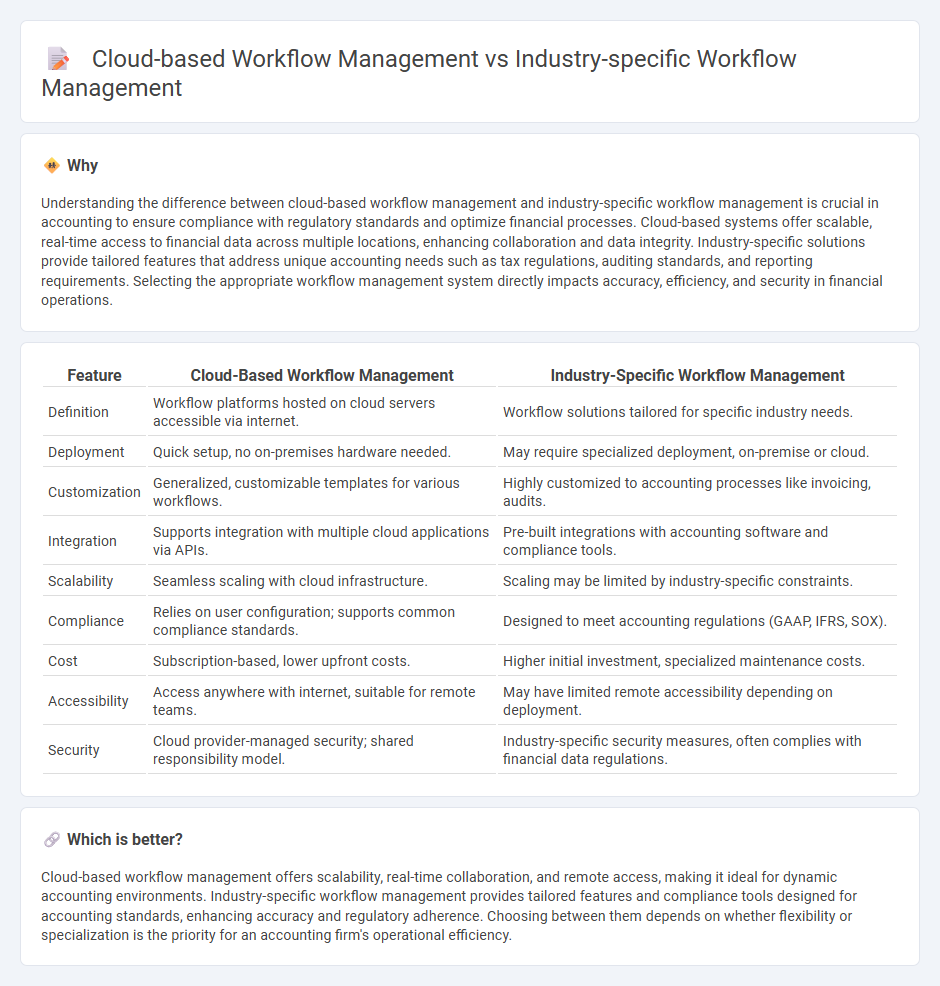
Cloud-based workflow management streamlines accounting processes by offering real-time data access, automation, and seamless collaboration across multiple devices, significantly enhancing efficiency and accuracy. Industry-specific workflow management, tailored for accounting, integrates specialized tools like tax compliance modules and audit trails, ensuring regulatory adherence and reducing manual errors. Discover how choosing the right workflow management system can transform your accounting operations and boost productivity.
Why it is important
Understanding the difference between cloud-based workflow management and industry-specific workflow management is crucial in accounting to ensure compliance with regulatory standards and optimize financial processes. Cloud-based systems offer scalable, real-time access to financial data across multiple locations, enhancing collaboration and data integrity. Industry-specific solutions provide tailored features that address unique accounting needs such as tax regulations, auditing standards, and reporting requirements. Selecting the appropriate workflow management system directly impacts accuracy, efficiency, and security in financial operations.
Comparison Table
| Feature | Cloud-Based Workflow Management | Industry-Specific Workflow Management |
|---|---|---|
| Definition | Workflow platforms hosted on cloud servers accessible via internet. | Workflow solutions tailored for specific industry needs. |
| Deployment | Quick setup, no on-premises hardware needed. | May require specialized deployment, on-premise or cloud. |
| Customization | Generalized, customizable templates for various workflows. | Highly customized to accounting processes like invoicing, audits. |
| Integration | Supports integration with multiple cloud applications via APIs. | Pre-built integrations with accounting software and compliance tools. |
| Scalability | Seamless scaling with cloud infrastructure. | Scaling may be limited by industry-specific constraints. |
| Compliance | Relies on user configuration; supports common compliance standards. | Designed to meet accounting regulations (GAAP, IFRS, SOX). |
| Cost | Subscription-based, lower upfront costs. | Higher initial investment, specialized maintenance costs. |
| Accessibility | Access anywhere with internet, suitable for remote teams. | May have limited remote accessibility depending on deployment. |
| Security | Cloud provider-managed security; shared responsibility model. | Industry-specific security measures, often complies with financial data regulations. |
Which is better?
Cloud-based workflow management offers scalability, real-time collaboration, and remote access, making it ideal for dynamic accounting environments. Industry-specific workflow management provides tailored features and compliance tools designed for accounting standards, enhancing accuracy and regulatory adherence. Choosing between them depends on whether flexibility or specialization is the priority for an accounting firm's operational efficiency.
Connection
Cloud-based workflow management enables seamless integration and real-time data access crucial for accounting processes, enhancing collaboration and efficiency across departments. Industry-specific workflow management tailors these cloud systems to meet accounting standards, regulatory compliance, and specialized financial reporting needs. Together, they optimize accounting operations by automating routine tasks and providing scalable, secure platforms for accurate financial management.
Key Terms
**Industry-specific workflow management:**
Industry-specific workflow management systems are designed with tailored features that address the unique processes and regulatory requirements of sectors such as healthcare, manufacturing, or finance. These solutions integrate specialized tools and compliance standards, enabling higher efficiency and accuracy in industry-specific operations. Explore how industry-specific workflow management can transform your business processes by catering directly to your sector's needs.
Customization
Industry-specific workflow management systems offer tailored customization options designed to meet the unique processes and regulatory requirements of sectors like healthcare, finance, and manufacturing, enhancing operational efficiency within those fields. Cloud-based workflow management solutions provide scalable and flexible customization capabilities that enable businesses across various industries to adapt workflows dynamically and integrate with other cloud services. Explore more to understand how customization in these systems can drive productivity and compliance in your industry.
Regulatory compliance
Industry-specific workflow management systems are tailored to meet strict regulatory compliance standards in sectors such as healthcare, finance, and manufacturing, with built-in features addressing sector-specific requirements like HIPAA, SOX, and GMP. Cloud-based workflow management platforms offer scalability and accessibility but may require additional customization and validation to align with industry regulations and data protection laws. Explore detailed comparisons to understand how each solution supports compliance goals in your sector.
Source and External Links
30 Best Workflow Management Software For Efficient Delivery Of 2025 - Industry-specific workflow management software is tailored to meet distinct industry needs such as IT, healthcare, construction, legal, marketing, HR, finance, manufacturing, and sales, helping optimize workflows and increase operational efficiency within these sectors.
25 Best Workflow Management Tools In 2025 - Cflow - Effective workflow management in industry-specific contexts involves defining, documenting, and data-driven optimization of workflows to ensure streamlined, prioritized, and continuously improved business processes.
Types of Workflow Management Systems | HighGear - Industry-specific workflow management tools cater to unique requirements in sectors like construction, healthcare, and manufacturing, enabling task automation, compliance management, and project tracking through both on-premise and cloud-based systems.
 dowidth.com
dowidth.com